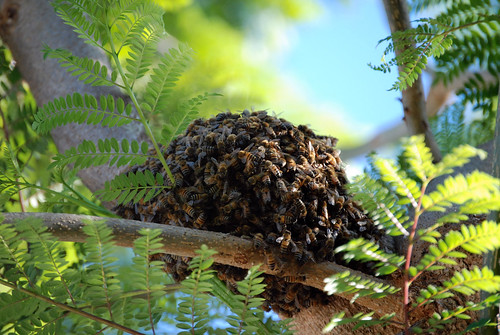Seeing a bee or a wasp fly around will usually put any person on high alert. Our danger sensors are on high alert, ready for the insect to come swooping down and attack us at any time. Our vigilance is well-placed since these insects are very notorious and they have the most vicious sting of all pests.
Bees and wasps have a modified egg-laying apparatus known as ovipositor or stinger. The stinger is used to subdue prey and also to defend their nests. These insects sting rather than bite to inflict their venom and injure their attacker. The venom is then injected into the wound made by the stinger. The venom contains chemicals that can induce pain, and it may also contain toxic proteins that can induce allergic reactions to highly sensitive people. Bees and wasps usually attack people when their hive is disturbed or out of defense.
Bees And Wasps Can Be Aggressive If Provoked
These insects normally do not sting people, especially if you do not do anything to provoke them. If they fly close to you, you can stand still and they won’t even mind you. However, if you try to swat the bees or wasps and miss, it is possible that the insects will view you as their attacker, which could lead to being stung. In addition, bee stings also usually occur if you have disturbed their bee hive. These insects can be very dangerous because in addition to carrying their venom and toxic proteins in their body, they can also attack as a group.

The Dangers of Bee and Wasp Stings
Among the biggest risks from bee and wasp stings are: allergic reaction and infection. A person can be stung by bees and wasps anywhere on his/her body, and it can be painful and frightening. Here are some of the symptoms of a bee or wasp sting:
- Pain
- Swelling
- Warmth in the surrounding area of the sting
- Hives
- Small amounts of bleeding
- Redness
- Itching
The general symptoms that can indicate a more serious or life-threatening allergic reactions are:
- Tickling in the throat
- Breathing problems
- Nausea and vomiting
- Anxiety
- Sweating
- Coughing
- Itching in other areas of the body aside from the sting area
Treatment For Stings
There are certain specific treatments for stings, but it can be determined by your doctor. Local reactions usually do not lead to serious reactions, but they can still be dangerous if the sting occurs in the mouth, nose or throat area since the swelling might close off the airway. The treatments for local reactions include:
- Removal of the stinger. Gently scuff across the site with a blunt-edged object. You must not try to pull out the stinger using tweezers since this may release more venom.
- Wash the sting area with soap and water, and apply a cold or ice pack wrapped with cloth. This will help reduce swelling and pain, and prevent infection.
- If the sting is on the arm or leg, you must elevate the limb to reduce swelling
- To reduce itching, you can apply a paste of baking soda and water, and leave it for 15 to 20 minutes. You can also apply a wet tea bag and leave it for 15 to 20 minutes. Another remedy for itching and pain is the application of antihistamine, corticosteroid cream, or calamine lotion.
- Observe the individual for the next hour for any signs of developing allergic reaction which will need immediate emergency medical treatment.
If the individual develops the symptoms of severe allergic reaction, immediately call for your local emergency service. Emergency treatment may include:
- Laboratory tests
- Breathing support
- Epinephrine
- Intravenous antihistamines
- Other specific medications
About 3% of the population is allergic to the toxic proteins carried by bees and wasps, resulting in a life-threatening reaction to the sting called anaphylaxis, which is a fatal allergic reaction. For this reason, if your area is known to have bee or wasp hives, it is best to address the infestation early on. You can also take preventive measures to avoid being stung, such as spraying your clothes with repellant, avoid wearing perfumes or other scented products, and avoid locations where hives and nests are present.
Citations:
Kris Lim is a health blogger who specializes in allergic reactions from insect bites and stings, such as from bees and wasps. She also contributes her advice and tips to pest control professionals at RovePestControlReviews.com.